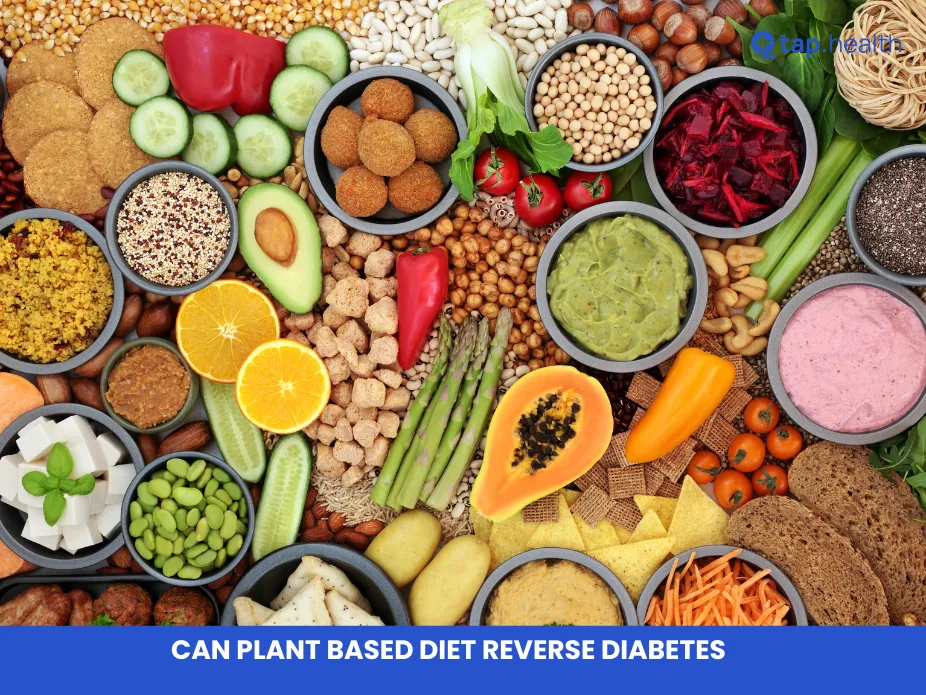Diabetes is a chronic condition that affects millions of people worldwide. Type 2 diabetes, in particular, is increasingly common, and managing it often involves medication, lifestyle changes, and careful monitoring of blood sugar levels. But could something as simple as a plant-based diet hold the key to not just managing diabetes, but potentially reversing it?
In this blog post, we’ll explore whether a plant-based diet can reverse diabetes, based on real research, expert opinions, and real-life examples. By the end, you’ll understand how a plant-based diet might play a significant role in managing diabetes and improving overall health.
What is Diabetes and Why is it So Important?
Before diving into the specifics of how a plant-based diet may help with diabetes, it’s important to understand what diabetes is. Diabetes is a condition where the body either can’t produce enough insulin (Type 1) or can’t use insulin effectively (Type 2). Insulin is a hormone that helps regulate blood sugar levels.
- Type 1 diabetes is typically diagnosed in childhood and occurs when the body’s immune system attacks insulin-producing cells in the pancreas.
- Type 2 diabetes is more common and usually develops in adulthood. It’s often linked to lifestyle factors, such as poor diet, lack of exercise, and obesity. In Type 2 diabetes, the body either doesn’t produce enough insulin or doesn’t use it properly.
The goal of managing diabetes is to keep blood sugar levels within a healthy range, preventing complications such as heart disease, kidney damage, and nerve issues. While traditional treatments include medication and lifestyle changes, the idea of using diet, particularly a plant-based diet, to manage or even reverse diabetes is gaining traction.
Can a Plant-Based Diet Reverse Diabetes?
A growing body of research suggests that a plant-based diet may help manage and even reverse Type 2 diabetes. But how exactly does it work?
1. Plant-Based Diet Reduces Insulin Resistance
One of the primary factors in Type 2 diabetes is insulin resistance, where the body’s cells don’t respond effectively to insulin. This means the body has to produce more insulin to keep blood sugar levels in check. Over time, the pancreas can become overworked and fail to produce enough insulin.
A plant-based diet, which focuses on whole foods like fruits, vegetables, whole grains, nuts, and legumes, is high in fiber and low in unhealthy fats. This type of diet helps reduce inflammation in the body, which is a key contributor to insulin resistance. By reducing this resistance, the body can use insulin more effectively, leading to better blood sugar control.
2. A Plant-Based Diet Helps with Weight Loss
Obesity is another major risk factor for Type 2 diabetes. Excess fat, especially around the abdomen, can contribute to insulin resistance. Many people who adopt a plant-based diet experience weight loss because plant-based foods are generally lower in calories and fat than animal-based foods.
By losing weight, people can reduce their body’s need for insulin and lower their blood sugar levels. In fact, research has shown that significant weight loss through a plant-based diet can lead to the reversal of Type 2 diabetes in some cases.
3. High Fiber Content Helps Control Blood Sugar
A key benefit of a plant-based diet is its high fiber content. Fiber helps regulate blood sugar by slowing down the absorption of sugar into the bloodstream. This prevents blood sugar spikes after meals and helps maintain more stable blood sugar levels throughout the day.
Fiber also plays a role in improving gut health, which has been linked to better overall metabolic function and insulin sensitivity.
Real-Life Scenario: How a Plant-Based Diet Helped Sanjay from Mumbai
Let’s take a look at a real-life example of how a plant-based diet can impact diabetes management.
Sanjay, a 45-year-old businessman from Mumbai, was diagnosed with Type 2 diabetes two years ago. He struggled with obesity and had a family history of diabetes. Despite taking medication, his blood sugar levels remained high, and he struggled with fatigue and other complications of the disease.
After attending a health seminar, Sanjay decided to try a plant-based diet, inspired by the stories he heard about people reversing their diabetes with this approach. He cut out animal products, processed foods, and sugary snacks, and instead focused on whole grains, vegetables, and legumes.
Within just a few months, Sanjay noticed significant improvements. His blood sugar levels dropped, his energy levels increased, and he lost 10 kilograms. He was able to reduce his medication, and his doctor was amazed at the results.
Sanjay’s story is not unique. Many people around the world have successfully managed and even reversed their Type 2 diabetes by switching to a plant-based diet.
Expert Contributions: Insights from Dr. Anjali Desai
Dr. Anjali Desai, a well-known endocrinologist in Delhi, offers her expert opinion on the role of plant-based diets in diabetes management. According to Dr. Desai, “A plant-based diet is an excellent tool for managing Type 2 diabetes. It helps reduce inflammation, improve insulin sensitivity, and support weight loss, all of which are essential for controlling blood sugar levels.”
Dr. Desai emphasizes that a plant-based diet doesn’t just lower blood sugar but also reduces the risk of cardiovascular diseases, which are common in people with diabetes.
What Does the Research Say About Plant-Based Diets and Diabetes?
Numerous studies support the idea that a plant-based diet can help manage or even reverse Type 2 diabetes. For instance, a study published in the journal Diabetes Care found that participants who followed a low-fat, plant-based diet had better blood sugar control than those who followed a typical diabetic diet. The study also showed that participants who adhered to the plant-based diet experienced significant weight loss.
Another study in The American Journal of Clinical Nutrition found that a plant-based diet led to improved insulin sensitivity and reduced the need for medication in people with Type 2 diabetes.
Recommendations Grounded in Proven Research
If you’re considering adopting a plant-based diet to manage diabetes, here are a few evidence-backed recommendations:
- Focus on Whole, Plant-Based Foods: Prioritize fruits, vegetables, legumes, whole grains, and nuts. These foods are rich in fiber, antioxidants, and essential nutrients that can help manage blood sugar levels.
- Limit Processed Foods: Avoid processed plant-based foods that are high in sugar and unhealthy fats, such as plant-based snacks and sugary plant milks.
- Monitor Blood Sugar Levels: If you’re new to a plant-based diet, work with your healthcare provider to monitor your blood sugar levels closely. It’s important to adjust your medication if necessary.
- Exercise Regularly: Physical activity can further improve insulin sensitivity and help with weight loss, making it a perfect complement to a plant-based diet.
- Consult a Registered Dietitian: A dietitian can help you create a balanced plant-based meal plan that meets all your nutritional needs while managing diabetes.
Frequently Asked Questions (FAQs) on Can a Plant-Based Diet Reverse Diabetes?
Q1: Can a plant-based diet reverse Type 1 diabetes?
A1: Currently, there is no evidence to suggest that a plant-based diet can reverse Type 1 diabetes. However, it may help manage the condition by improving overall health and reducing complications.
Q2: How long does it take for a plant-based diet to show results for Type 2 diabetes?
A2: Some people see improvements in blood sugar levels within a few weeks to a few months of adopting a plant-based diet. However, individual results vary, and it’s essential to work closely with your healthcare provider.
Q3: Is a plant-based diet safe for people with diabetes?
A3: Yes, a plant-based diet can be very safe for people with diabetes, but it’s important to focus on whole foods and monitor blood sugar levels closely. Consulting with a healthcare provider is recommended before making significant dietary changes.
Q4: Can I eat fruits on a plant-based diet if I have diabetes?
A4: Yes, fruits are an important part of a plant-based diet. However, it’s best to choose whole fruits rather than fruit juices and be mindful of portion sizes to avoid blood sugar spikes.
Q5: Does a plant-based diet lower the risk of diabetes in the first place?
A5: Yes, studies have shown that plant-based diets can lower the risk of developing Type 2 diabetes, especially when combined with regular physical activity.
Conclusion
While adopting a plant-based diet may not be a quick fix, the research and real-life examples suggest it’s an excellent long-term strategy for managing and even reversing Type 2 diabetes. With its ability to reduce insulin resistance, support weight loss, and regulate blood sugar levels, a plant-based diet offers hope for millions of people affected by diabetes. Remember to consult with your healthcare provider before making any drastic changes to your diet, and take it one step at a time toward better health.




